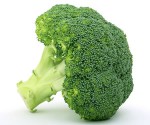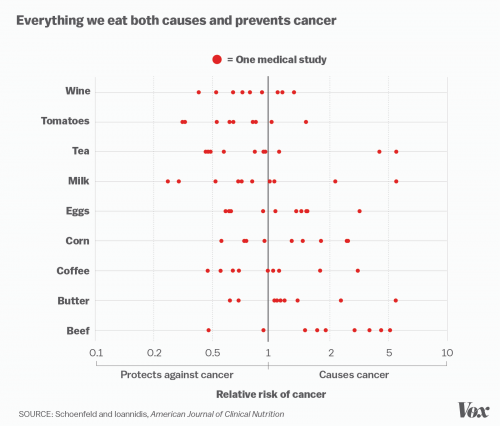I get asked that question so often. My usual answer is, “I don’t know, probably.” (It’s also a good answer if they ask, “does this prevent cancer?”) That’s safe to say, because just about anything can be found associated with cancer, if you look hard enough. I’ve read enough papers to know that if you can find a study accusing a food to be of the devil, you can find another one saying it’s angelic. And there will probably be some feckless mass media organ screaming CAUSE or CURE.
So this analysis of putative cancer agents is really useful. You can see that the studies are all over the map.
Did you know that broccoli contains entirely natural and known carcinogenic pesticides? And that it also contains glucosinolates and isothiocyanates, which are supposed to be good for you and prevent cancer? But wait — at high concentrations, glucosinolates are known to cause cancer in rats! And you know that most plants don’t want to be eaten by animals, so they’ve evolved chemical defenses. Why should they be good for you, you plant-killer, and how can chemicals be simultaneously good and bad?
You simply can’t judge the effect of a compound from a single study. You must understand the background to the work, the context in which it is implied, and other related studies that might tell you something about the mechanism of its operation. That chart above is also a little misleading: all clinical trials are not equal. What is the sample size, what population is involved, what protocols were used?
Just keep that in mind next time you see an article in the popular press touting a food as the simple cause or cure of a disease…and next week another article claiming the opposite, that’s not a problem with the science. It’s a problem with the press. That range of results is an indication of the complexity of the problem.
(But not to let all of science off the hook: there’s also a fair amount of bias out there. You can find old studies praising the health benefits of cigarettes, or new ones claiming that global climate change is nearly nonexistent, which is a consequence of the taint of big money.)




I’ve dropped this link before:
http://www.ncbi.nlm.nih.gov/pmc/articles/PMC54831/
Dietary pesticides (99.99% all natural).
B N Ames, M Profet, and L S Gold PNAS
Abstract
The toxicological significance of exposures to synthetic chemicals is examined in the context of exposures to naturally occurring chemicals. We calculate that 99.99% (by weight) of the pesticides in the American diet are chemicals that plants produce to defend themselves. Only 52 natural pesticides have been tested in high-dose animal cancer tests, and about half (27) are rodent carcinogens; these 27 are shown to be present in many common foods. We conclude that natural and synthetic chemicals are equally likely to be positive in animal cancer tests. We also conclude that at the low doses of most human exposures the comparative hazards of synthetic pesticide residues are insignificant.
Everything causes cancer,
There’s no cure, there’s no answer . . .
re 2:
Yes It’s all in the dose. LD50, anyone?
It’s simple, really: the foods you hate cause cancer, those you like protect against it!
It has long been a running joke in the UK that the Daily Mail has an long-term project to divide up all substances into either curing or causing cancer – see eg
I don’t care if causes cancer, I just don’t eat it because it tastes…green. I’m with G.H.W. Bush on that one.
…That has little to do with cancer.
Well, at least good ol’ oxygen doesn’t cause cancer.
oh, wait… nevermind
Well, a food/chemical’s LD50 may not be relevant to cancer, but I’d be surprised if dosage isn’t.
I facepalm at the black-and-white thinking involved in dividing things the way the Daily Mail does, and it’s the same thing I’ve observed in a lot of quackery supporters. It’s not specific to cancer, but they commonly assume that you can just lump everything into “toxic” and “safe” categories. Hence they’re always confused that we simply don’t endorse the “common sense” answer of banning everything “toxic.” I’ve come to tell such people that if someone tells you of the danger of some chemical and that they don’t mention the dose, they are trying to deceive you.
Dosage surely is relevant with regard to cancer, but only probabilistically – higher dosage increases the probability of damaging the right portion of DNA of the right cell in order to cause cancer.
Perhaps maybe analogically to LD50 there could be found a treshold, above vhich the probability o the cancer occuring as a direct consequence of concrete chemical could be ascertained, but not easily, the background noise being very high. Unlike LD50 finding such dosage would possibly be an experimental nightmare for most naturally occuring chemicals.
And there will probably be some feckless mass media organ screaming CAUSE or CURE.
Alas, untrue: “feckless” means (approximately) ineffectual, and such organs do have their effects.
As for cancer: anything which keeps someone alive long enough to get it qualifies as a “cause”, no?
LD50 is a test of acute toxicology and is not used in carcinogenesis studies. Also, LD50 is itself a probabilistic test.
Pierce@11: Father Jack Hackett may not have been very effectual, but he certainly wasn’t feckless.
What, actual humility regarding the science of nutrition?
HERETIC! CAST HIM OUT!
Ah-hem…WHICH CANCER ARE WE TALKING ABOUT? Cancer isn’t one disease. Asking whether or not something can cause cancer is like asking whether it can cause infectious disease. Some agents are well documented to cause some cancers and prevent others.
While at U of O we had a saying in our lab the people wearing lab coats cause cancer in rats.
Just throwing this out there: lately we’ve done some environmental toxicology experiments with Roundup — exposing embryonic zebrafish to the stuff to see if it affects development.
To my surprise, it does absolutely nothing. Doesn’t increase mortality, doesn’t cause any defects. If we crank up the concentration to something ridiculous, then we get increased death. Now we’re stuck with a result that’s pretty much unpublishable — when it should be an acceptable negative result.
Probably the same thing would be seen with salt concentration. Or high sugar concentrations, especially sugars that your zebrafish can’t metabolize. The osmotic pressure of the water is higher than your zebrafish can tolerate, making it a general, not a specific, poison.
One of the major causes of many kinds of cancer is living past the age of 25.
You really should have been killed by a saber-tooth tiger loooong before that.
Trust me, I’m a archaeologist.